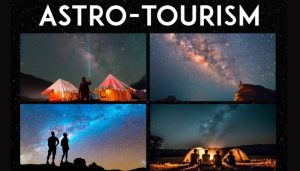
Set out on an exciting weekend at the 42 Acres estate in Frome, where you may take advantage of the opportunity to participate in land regeneration activities, as well as the fresh air, cosy accommodations, and delectable food
The scene is made funnier by the loud honk of geese moving off from the lake, which coincides with trembling reeds and a brief break in the cloud reflection on the water’s surface. After flitting by, a butterfly lands on my boot. We’re taking a guided walk at 42 Acres, a Somerset retreat centre, wildlife reserve, and regenerative farm that seems alive with life all around it.
As we go, our guide, Tasha Stevens-Vallecillo, one of the visionaries behind the retreat and an expert on plants and wild foods, pauses to show out yarrow, ribwort plantain, and a massive white reishi mushroom. “Medicine can be found all over the place. All you have to do is know where to search,” she says.
The farm’s name is actually a misnomer. What began a decade ago with the original 42 acres and farmhouse, where private retreats are still hosted, has now expanded to encompass 173 acres (70 hectares) with new accommodation options. Lara and Seth Tabatznik, siblings and avid environmentalists, manage the farm, which operates entirely on renewable energy. It’s a truly inspiring place to explore.
The property features ancient woodlands, an outdoor sauna, and a seven-acre lake ideal for wild swimming or rowing (the best way to observe resident beavers at dawn or dusk). Fresh produce is sourced from the no-dig garden, the “edi-mental” walled garden (where everything is both ornamental and edible), and the bountiful polytunnels. There’s also a micro-mushroom farm, a bee garden with wild and locally raised bees, and thousands of nut and medicinal trees (such as the super-powerful sea buckthorn and rosehip).
Our accommodations are in the recently renovated 13th-century hermitage, originally a retreat for monks. It’s luxurious yet unassuming, bathed in natural light and featuring open fires. My room is soothing, decorated in soft tones with a spacious bed, sheepskin rugs, and stained-glass windows in the bathroom. For those seeking different options, there are cottages, converted barns, and even a houseboat available. Every aspect is designed to promote relaxation.
“The goal is to create a sanctuary where people can unwind, reconnect with nature, and learn about living in harmony with the land,” explains Tasha.
I’m participating in a Rewild retreat, one of the three new themed Wild Weekends offered here. While each weekend provides an opportunity to disconnect from technology and immerse oneself in nature, Rewild specifically focuses on nature restoration. The Renourish retreat emphasizes the soil-to-gut food philosophy, including foraging and cooking, while Restore offers more indulgent experiences like yoga and massage. Additionally, there are self-guided retreats where guests can book a room and partake in activities such as gardening and meditation at their leisure.
Whether it’s the medicinal mushroom broth or the wild garlic and cheddar muffins, every bite is excellent
Experts from a variety of fields are also drawn to the retreats. Derek Gow, a trailblazing rewilder and the author of “Bringing Back the Beaver,” took us on a tour to see how the 2016 reintroduction of beavers is changing the environment, improving wetlands, and fostering biodiversity while we were there. He came to sit with us by the fire later that night and regaled us with tales from his most recent book on wolves.
(There are still spaces available for this weekend’s retreat, which is being hosted by Lulu Urquhart, the 2022 RHS Chelsea Flower Show best-in-show winner for her garden, “A Rewilding Britain Landscape.”) For anyone who would like to drop by on the spur of the moment, there are spots available.
During every visit, food and group meals are essential components. Every meal is nutrient-dense, organic, and made mostly from ingredients found on the land or within 42 miles of it, including foraged and wild foods. (The on-site Tiny Wild kitchen sells takeout items in addition to serving up specialties like tomato and rosehip ketchup.) From the cheddar muffins and wild garlic to the healing mushroom broth, every mouthful is exquisite. A Food, Fire, and Forest experience is also offered during Wild Weekends. In this experience, food is prepared over an open flame and consumed in a clearing beneath a fairy-lit forest canopy. Unfortunately, we were unable to witness this during our visit due to excessive rain.
Nevertheless, this doesn’t deter us from getting our hands dirty and witnessing land regeneration in action. On our second morning, after breakfast, we put on our wellies and join Martin White, the land steward, to assist with creating hedgerows and planting nearly 300 trees. These trees are a mix of native species including hawthorn, field maple, dogwood, and hazel. Martin explains, “We’re allowing the land to guide us, while managing it in a way that benefits both people and biodiversity. We’ve observed an increase in wildlife, from bats and woodpeckers to bees, and we cultivate and harvest a substantial amount of food.” Following the successful model at Knepp in West Sussex, there are plans to reintroduce storks here and to introduce wildcats, which will initially be housed in large enclosures as a step toward eventual reintroduction into the wild.
Apart from weekend getaways, 42 Acres holds a number of day events all year round. These include “energy exchanges,” where guests can help out on the farm and take part in permaculture activities, as well as workshops on wild medicine.
42 Acres has a busy schedule, but the ambiance is surprisingly calm and leisurely. The main goals are to provide nourishment on all fronts and lead a fulfilling life.



